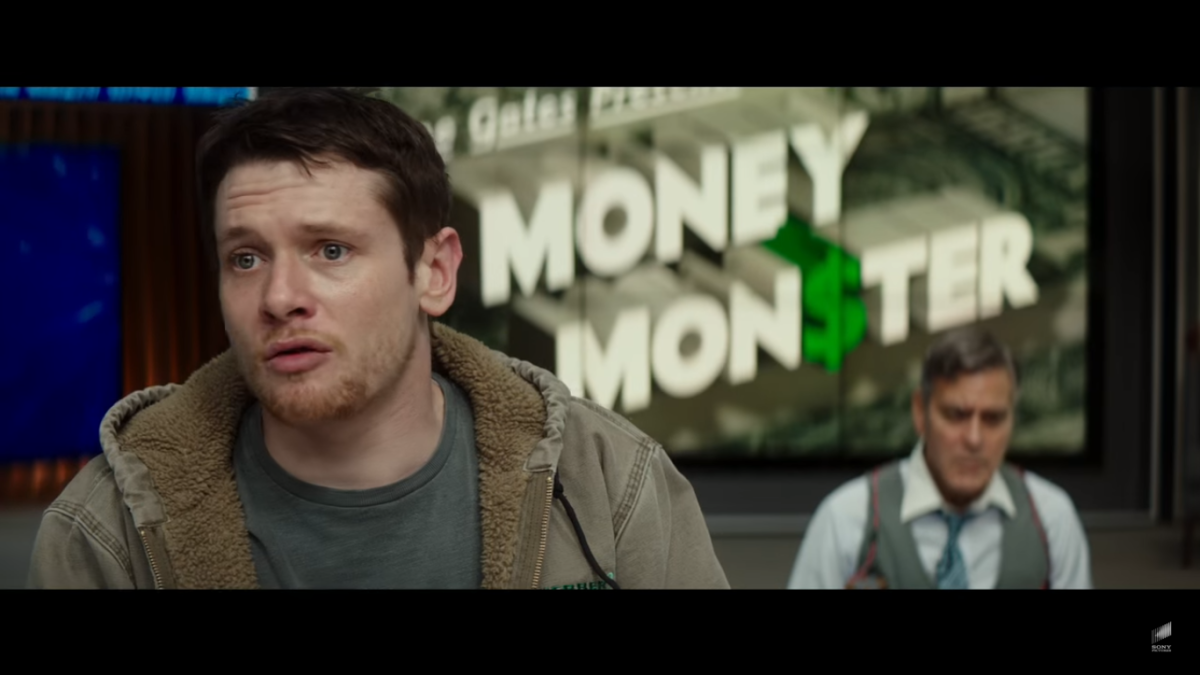After willing myself to be excited for this film upon entering the theater, I left having enjoyed about half of it while the rest left me confounded. Money Monster had a lot of things from the outset that were worth celebrating, with George Clooney once again playing the part of the clown, rising star Jack O’Connell getting another chance to shine in a mainstream film, and the return of Jodie Foster behind the camera for the first time since 2011’s The Beaver. There is also the fact that it’s a mainstream movie directed by a woman and that it is an original film that isn’t a sequel, prequel, or tentpole comic book entry. With a stacked set of features like that, I really wanted to love it.
The fault in it is that, by the end, it’s very clear that Foster just wasn’t sure what film she was trying to make.
It’s immediately put in a tough position of winning over the audience from the first moment we meet our lead, Lee Gates (Clooney.) He’s instantly unlikable and never really proves he can be anything other than egotistical, obnoxious, and absurdly committed to his role as mindless puppet. Lee is looked after and kept afloat by his hardworking, brilliant director, Patty (Julia Roberts), whose diligent effort has managed to make a show prosper when it could have died any number of times. We learn at the start of the film that, after years on Money Monster, her hard work and talent have been recognized by higher-ups, and she finally accepts another job. However, things quickly go awry when on her last shoot with Lee. A mysterious young man named Kyle (O’Connor) enters the sound stage with a gun and bomb in hand. He’s furious and looking for answers on how a stock that Lee had assured viewers would soar instead ended up losing millions over the course of a single night.
Based on having seen Foster’s film Home for the Holidays, it already appears she might be better suited to small, personal fare, as she flounders with some of the bigger set pieces, going far too broad to accommodate the admittedly ridiculous story.
Where the film manages to do well is in its astute characterization of Patty, who throughout the entirety of the film, never loses her cool and keeps in sight what the real significance of this entire event is. Patty excels in every scene she’s in, and Julia Roberts adds a sense of gravitas to a character who very easily could have simply been a foil to Lee. In the moments where we get to watch her in her element, reporting the news, we learn just as much about who she is and how she operates. Both Lee and Kyle are given telegraphed and clichéd moments of characterization that serve to mainly let Clooney and O’Connell bounce off one another’s energy or to try to paint either with some shade of depth. Patty is barely given a passing line about her life outside of work and, by the end of the film, is still the one who feels the most substantial and fleshed-out. It’s she who doesn’t just keep Lee alive and jump-start the main investigation in the film, but is also the character who keeps the level of intrigue afloat from start to finish.
It’s lucky that the film managed to obtain such strong performers, because otherwise, the script would have easily toppled as character motivation and general believability were tossed out the window. Instead, it’s Roberts and Clooney who sell Lee and Patty’s dynamic and O’Connell who instills Kyle with his unstoppable anger through sheer talent and experience rather than from anything the script gives them.
Where Foster does manage to thrive is with anything that deals with the mechanics of journalism. Every shot of Patty and Lee at work is imbued with a sense of admiration for the people whose job is to capture the full story and deliver honest and steadfast reporting.
It’s too bad she didn’t stick within that line of storytelling, because it’s when she tries to tackle weightier subjects that the film veers off course. There comes a point where it’s difficult to tell if it’s condemning the rich, who ignorantly go about their lives and use money to manipulate, or those who rage against the system. Political while still trying to be sheer entertainment fluff, offbeat hilarious in its serious moments, and containing the single most embarrassing dancing scene captured on screen since emo Peter Parker in Spider-Man 3, Money Monster suffers from a profound crisis of identity.
I enjoyed that women run the show, tirelessly and always with a roll of the eyes when someone she’s been placed in care of messes up, and at 90 minutes, it’s often a harmless piece of simple high-speed fun. However, the cracks are very apparent, and despite the fun to be had, it’s not easy to actively shut your brain off to make sure everything still makes sense by the end.
Money Monster showcases a director who has grown in confidence and ambition but a storyteller who is still struggling to create a cohesive identity.
Allyson Johnson is a twenty something writer and a lover of film and all things pop-culture. She’s a film and television enthusiast and critic over at TheYoungFolks.com who spends too much of her free time on Netflix. Her idols are Jo March, Illana Glazer, and Amy Poehler. Check her out at her twitter @AllysonAJ or at The Young Folks.
—Please make note of The Mary Sue’s general comment policy.—
Do you follow The Mary Sue on Twitter, Facebook, Tumblr, Pinterest, & Google +?









Published: May 17, 2016 02:23 pm